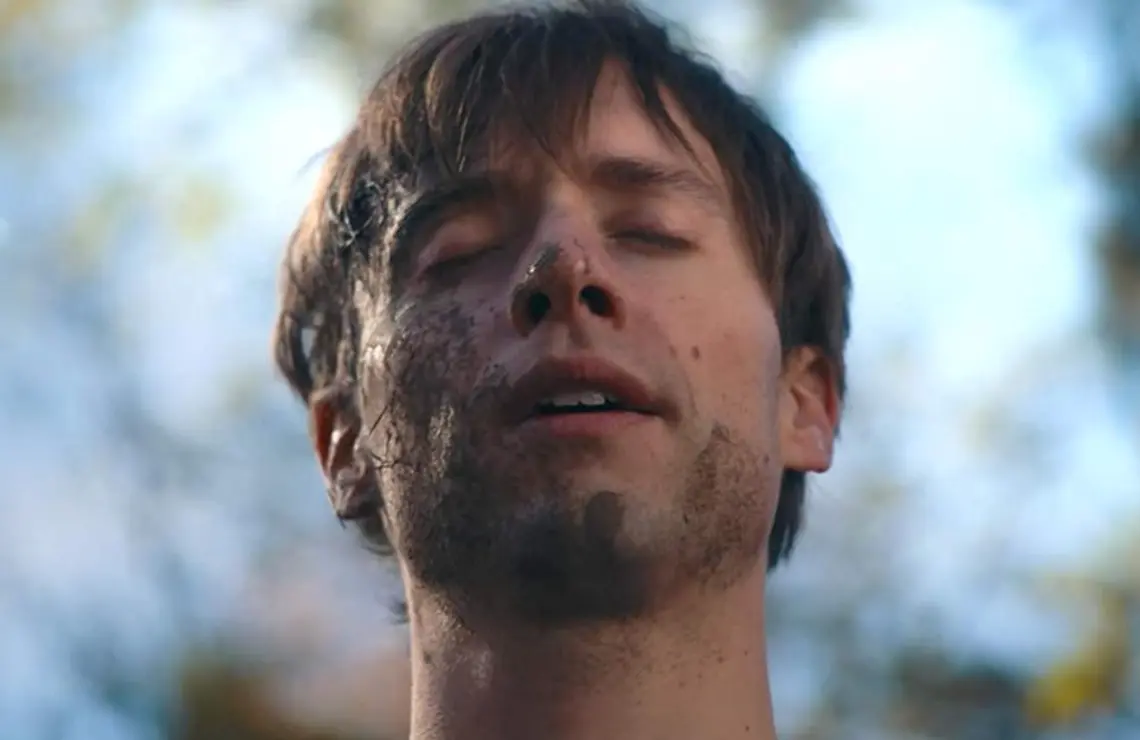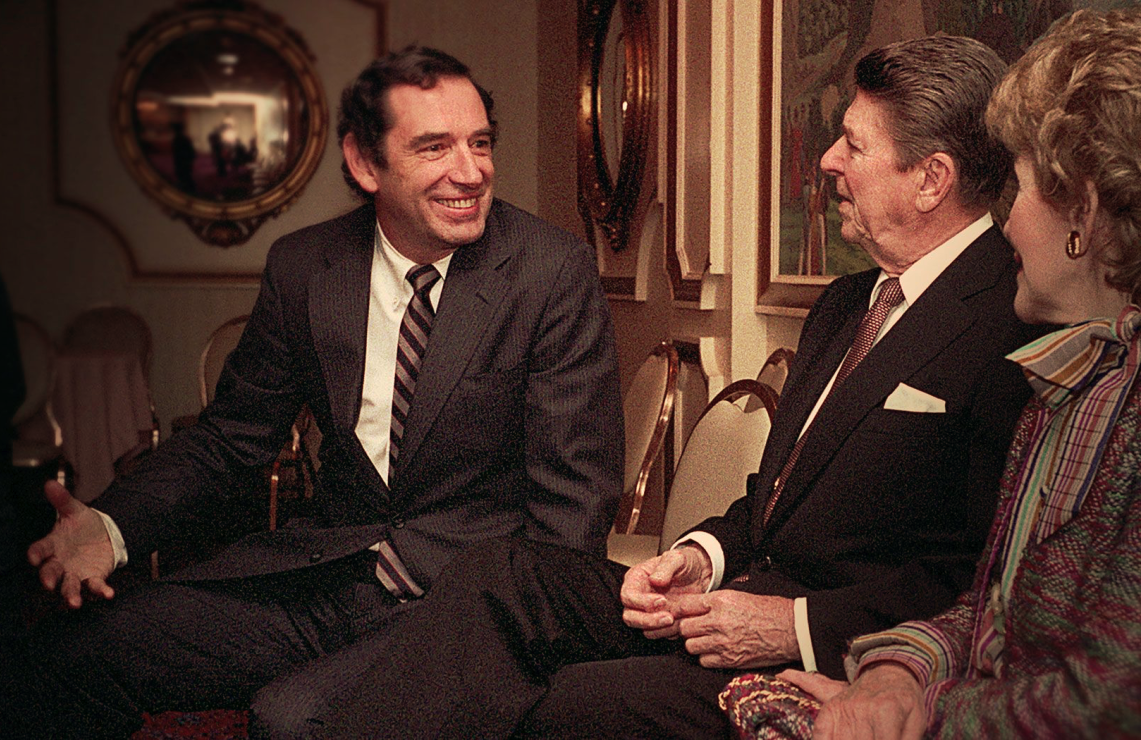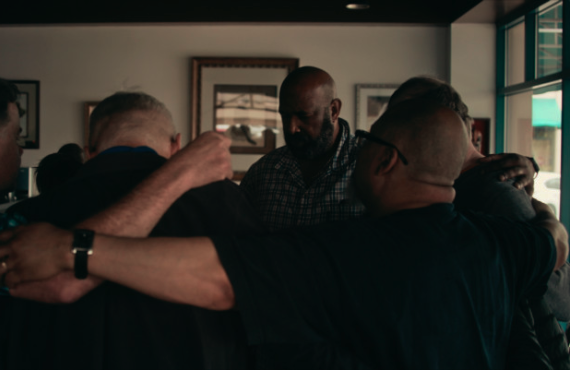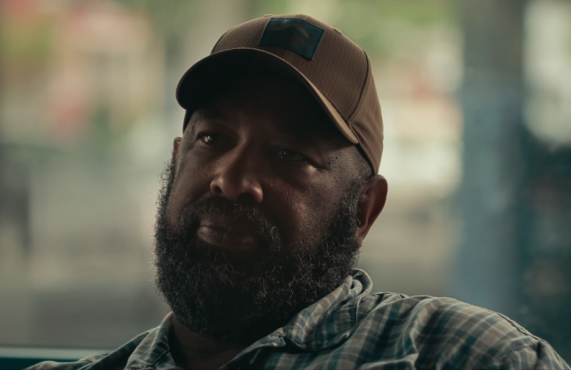The Family Isn’t As Nefarious As Netflix's The Family Says It Is
-
 David Rysdahl in a reenactment of author Jeff Sharlet's experience inside The Fellowship, the secretive Christian organization that is the focus of Netflix's The Family.
David Rysdahl in a reenactment of author Jeff Sharlet's experience inside The Fellowship, the secretive Christian organization that is the focus of Netflix's The Family.The Family
5-part docuseries
Watch on NetflixWhen Jeff Sharlet’s book The Family came out in 2009, revealing details of a Christian syndicate that had quietly exerted influence over congressmen, senators, and presidents for decades, it caught even seasoned political observers off guard.
Who knew that the National Prayer Breakfast, one of Washington’s more milquetoast rituals, was the brainchild of a man who openly admired fascist organizing techniques? Or that thousands of prayer groups around the world could be traced back to one person, a man whose quest to “build relationships for Jesus” with powerful figures led him to Muammar Gaddafi and the Ugandan president who proposed the death penalty for gays?
Well, actually, I did.
For the first few weeks after college in 1987 I was in the tender clutches of this network, known as The Fellowship, living at its primary entry point for recruits on a quiet cul-de-sac in Arlington, Virginia. I was there for the same reason thousands of young men have gone there over the years — to grow deeper in their faith and be part of something bigger than themselves.
In high school I’d taken part in Bible groups put on by the Christian ministry Young Life, whose leaders had ties to The Fellowship. They told me about this ultra-low-key organization that was doing the Lord’s work inside the nation’s capital, nurturing dozens of weekly prayer groups and meeting one-to-one with the powerful offering spiritual guidance.
I knew The Fellowship owned a stately mansion in Arlington known as The Cedars, where political leaders, foreign diplomats, kings, and other VIPs could go, far from the media glare, and let down their guard. They’d receive understanding, prayer, and support. I’d heard of Fellowship associates who were building relationships with political leaders around the globe.

At the heart of The Fellowship was Doug Coe, a charismatic, limelight-avoiding spiritual advisor who is described in the Netflix series as “the most powerful man in Washington you’ve never heard of.”
Back then, none of this sounded particularly nefarious. In fact, it sounded like something I wanted to be part of. I’d read Chuck Colson’s bestseller Born Again, in which Richard Nixon’s former “hatchet man” described the moment when he stopped hating the Iowa senator Harold Hughes — who basically opposed everything Nixon stood for — and learned to love him like a brother.
Doug Coe and The Fellowship had fostered the Colson-Hughes relationship. When Colson got out of prison, the two men started a ministry for inmates that was called, not surprisingly, Prison Fellowship. Even though I’d taken a job with a think tank after college, I imagined a future working for Colson or some entity that had the Fellowship’s blessing. So I made inquiries and was accepted in a men’s house located just down the street from The Cedars in leafy Arlington.
Watching The Family has been difficult for me, partly because of the triggers — more on those later — but also because I’m torn between the show’s excellent investigatory journalism on the one hand, and its needlessly dark and conspiracy-seeking tone on the other. Sharlet and the show’s director Jesse Moss spend most of The Family’s four-hour running time documenting the relationships The Fellowship has built over the decades with some of the worst actors on the planet, all in the name of Jesus.

From adulterous senators to anti-LGBTQ European demagogues to African gangster-statesmen, The Family shows over and over how The Fellowship was co-opted by politicians to curry favor with the evangelical power structure. A movement that once counted Jimmy Carter and Harold Hughes as supporters became, over time, an enabler of right-wing dictatorships and traditional-values movements around the world — all with the tacit blessing of Doug Coe and the men around him.
What The Family doesn’t do is explain why The Fellowship exists in the first place. Why were so many upstanding men (and, um, some women in there, somewhere) not only drawn to Fellowship work but committed to it for years? Sharlet is uninterested in this question because he’s convinced of The Fellowship’s essentially diabolical nature. At one point he refers to it as “the darkest expression of religious life that I’ve found in 20 years,” which prompted Sophie Gilbert in The Atlantic to ask: What is ISIS, a potted plant?
In The Family’s telling, The Fellowship is another one of those little-understood groups that feeds into a broader theocratic movement to subvert democracy and turn back time. This, I think, is a mistake. The Fellowship is more conservative than ever, but it’s an outgrowth of a hopeful strain of Christianity that crosses all political lines and is rooted in the belief that God never gives up on God’s creation. This eternal optimism provides the fuel for a tremendous amount of worthy charitable work, but it can also be tremendously naive about power and privilege.
In episode four, we’re treated to the almost unbelievable Libyan caper involving Coe and a former congressman named Mark Siljander. Flying to Tripoli without passports or visas, they essentially become hostage bait in order to build a relationship with Gaddafi, who at the time was an international pariah desperate to get out from under a suffocating blanket of sanctions. Why do they want a relationship with Gaddafi? Because Jesus. Why would Gaddafi want a relationship with two well-connected Christian men from America? Do I even need to answer that?
Sharlet is right to call out The Fellowship’s willingness to be used by dictators and demagogues. And the secrecy business is ridiculous. The C Street townhouse, where members of Congress stayed at below-market rents, may never have come to light if so many residents, including John Ensign and Mark (Appalachian Trail) Sanford, hadn’t been caught in extramarital affairs.
But when Sharlet describes Coe’s worldview as “either the most naive theology ever created or the most cynical one,” concluding that “it somehow manages to be both at the same time,” I can’t go there. That’s the same mindset that believes millions of pro-life Christians who elected the current president have cynically cast their gaze away from his daily lies and depredations for the sake of two judges.
At this inflection point in our culture, it seems to me that producers need to begin working on a type of investigative storytelling that does not always impute bad faith to its subjects — especially when, as in the case of The Fellowship, they are enabling rather than doing bad things.

To director Moss’ credit, we see a glimmer of this approach in part five of The Family. While documenting the 2017 National Prayer Breakfast, Moss learns of a men’s prayer group in Portland, Oregon, that’s willing to be filmed. The group is mostly older men, half of them African-American. And they are not naive.
Moss is allowed to film on the condition that he take part in the group. An older white guy turns to him and demands, “Why is your crew all white?”
“That’s a good question,” Moss says.
“Well, answer it!”
Moss stammers something about diversity and hiring women. “I didn’t ask you about women,” the man interrupts. “I asked you about black people!”
Observing this is Larry Anderson, one of group’s senior statesmen, who tells Moss, “This is how you get stripped down ... It hurts.” Then Anderson describes how he got stripped down 25 years ago, walking into his first National Prayer Breakfast and seeing “a bunch of old white men” who “used to look at me in their stereotypical view that I was someone who needed to be helped or changed by them.”
Infuriated by “their inappropriate missionary attitude,” Anderson was ready to high-tail it back to Oregon — “but God changed my heart (and) mind about that real fast,” he says. Cut to a photo of Coe and Anderson sharing a moment.
What Moss got a taste of in this prayer group was what I call radical accountability. To an outsider it might look like guys yelling at each other, but these in-your-face confrontations have a purpose — to make a brother see his sin, swallow his “pride” and accept the discipline of the larger group.

At the end of their meeting, Anderson stares sternly at the director and tells him, “Ask God to defeat you, and we’ll pray and be in agreement about that.” This vivisection of the ego is the price of becoming a member in good standing with The Fellowship. Whatever it is, it’s not cynical.
But Anderson is right, it hurts. In fact, watching him and the others bluntly tell off the director of The Family was triggering. The last time someone got in my face like that, it was at The Fellowship.
At Arlington I lived in a house with half a dozen recent college graduates, spending hours together learning to accept radical accountability from others. Problem was, a lot of these brothers of mine were immature jerks. Guys were constantly escalating minor disagreements to aggressive confrontations that left me shaken and sometimes in tears.
But my lasting memory of that time is the way they treated Howie. A frequent visitor to the cul-de-sac, Howie was in his 30s and kind of an odd, lonely guy. Obviously the brothers had invited him in with the idea of bringing him into the fold. Howie lapped up their attention. Once it was clear that he wasn’t working out, though, the brothers decided to cut him off. I could’ve objected but I already had one foot out the door myself. The next time Howie showed up, they dropped the hammer. He meekly retreated to his car and was never seen again.
When Sharlet published his books on The Fellowship a few years back, I didn’t read them, not wanting to relive those memories. A friend of mine, also a survivor of Arlington, won’t even watch The Family. But I’m glad I did. For the first time I see the tragic flaw in The Fellowship’s approach. Accountability only works when you have power over someone, as the brothers in Arlington had over each other (and for a time Howie and myself). But when you’re trying to work with someone with more power or money than you, good luck holding them accountable.
Worse, the Fellowship’s rightward move means that entire spheres of policy are beyond reproach. We see this in episode four, when the leader of the family-values movement in Romania trots a little-known Alabama congressman and Fellowship ambassador around town as proof that God hates gays. Even my early hero, Chuck Colson, drifted further and further back into Nixonland as he became a rich and famous Christian author.
By its silence the Fellowship has allowed itself to be co-opted by the religious right. And yes, I think its leadership should be held accountable for that. Given how much the Fellowship’s training of young men emphasizes accountability, it’s amazing that Doug Coe and his senior circle refused to speak truth to power because it would get in the way of their “relationships.”
As Larry Anderson might ask, how else do you get stripped down?
Pressed for time? Jeff Sharlet tells his own Arlington story in Part 1 of The Family. Much of it involves reenactments, including a not-very-charismatic portrayal of Doug Coe by James Cromwell. It’s not essential, so you can skip to Part 2.
Peopel are talking about The Family in our forums. Join the conversation.
Aaron Barnhart has written about television since 1994, including 15 years as TV critic for the Kansas City Star.
TOPICS: The Family, Netflix, Documentaries